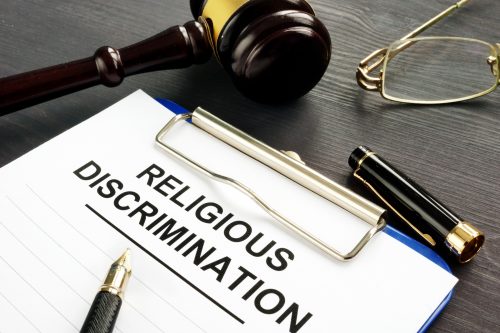 Employers are prohibited from discriminating against or harassing applicants or employees based on their real or perceived religious beliefs under the California Fair Employment and Housing Act (FEHA). Employer discrimination on the basis of an individual’s affiliation or relationship with a person of a certain religious faith is likewise prohibited under the FEHA.
Employers are prohibited from discriminating against or harassing applicants or employees based on their real or perceived religious beliefs under the California Fair Employment and Housing Act (FEHA). Employer discrimination on the basis of an individual’s affiliation or relationship with a person of a certain religious faith is likewise prohibited under the FEHA.
Read on to learn more about what religious discrimination means and how an employment law attorney can help you if you have become the victim of it. Reach out to The Law Offices of Larry H. Parker at 800-333-0000 for a free legal consultation.
What is a “religious belief”?
According to the FEHA, “religious belief” includes the keeping of the Sabbath or other holy days, as well as the acceptable time required for travel before and after such observances. A “religious credo,” according to the FEHA, is a set of beliefs, observations, or practices that a person honestly holds and places in their lives in a position of importance comparable to that of historically structured religions.
According to the California laws, an employer is required to explore any available reasonable alternative means of accommodating the religious belief or observance, including the possibility of excusing the person from those duties that conflict with his or her religious belief or observance, or allowing those duties to be performed at a different time or by a different person.
Furthermore, the California Workplace Religious Freedom Act of 2012 (WRFA) broadens the definition of religion to include all aspects of religious belief, creed, observance, and practice, as well as religious dress and grooming practices, such as clothing, head or face coverings, jewelry, artifacts, or other items associated with a religious observance. This includes religious observances regarding the employee’s body, head, and facial hair.
Employers in California are obligated by law to grant exceptions for religious practices when it comes to workplace appearance requirements. Employers are obligated under California law to offer “reasonable accommodation” if the accommodation does not create “undue hardship.”
The criteria for “undue hardship” in federal and state law is different. Employers are exempt from providing religious accommodations under federal law if doing so would cause “minimum hardship” to the business. In California, however, an employer must show that the religious accommodation in question costs the business “substantial hardship or expense.”
In California, reasonable accommodation also includes employment changes that allow religious employees to practice their faith. This might involve adjusting work schedules to accommodate religious observances or holidays, as well as enabling employees to pray at work during a break, in a secluded space, or at regular intervals throughout the day.
Furthermore, under California law, businesses are prohibited from retaliating against employees who request reasonable accommodations for religious reasons.
If an employee is unable to work on a specific day due to a religious holiday or observance, California companies must make a reasonable accommodation. It’s worth noting that reasonable accommodations, including as time off for religious holidays, are assessed case by case.
If your employer has prevented you from your legally guaranteed religious rights, contact The Law Offices of Larry H. Parker at 800-333-0000 for a free legal consultation.



